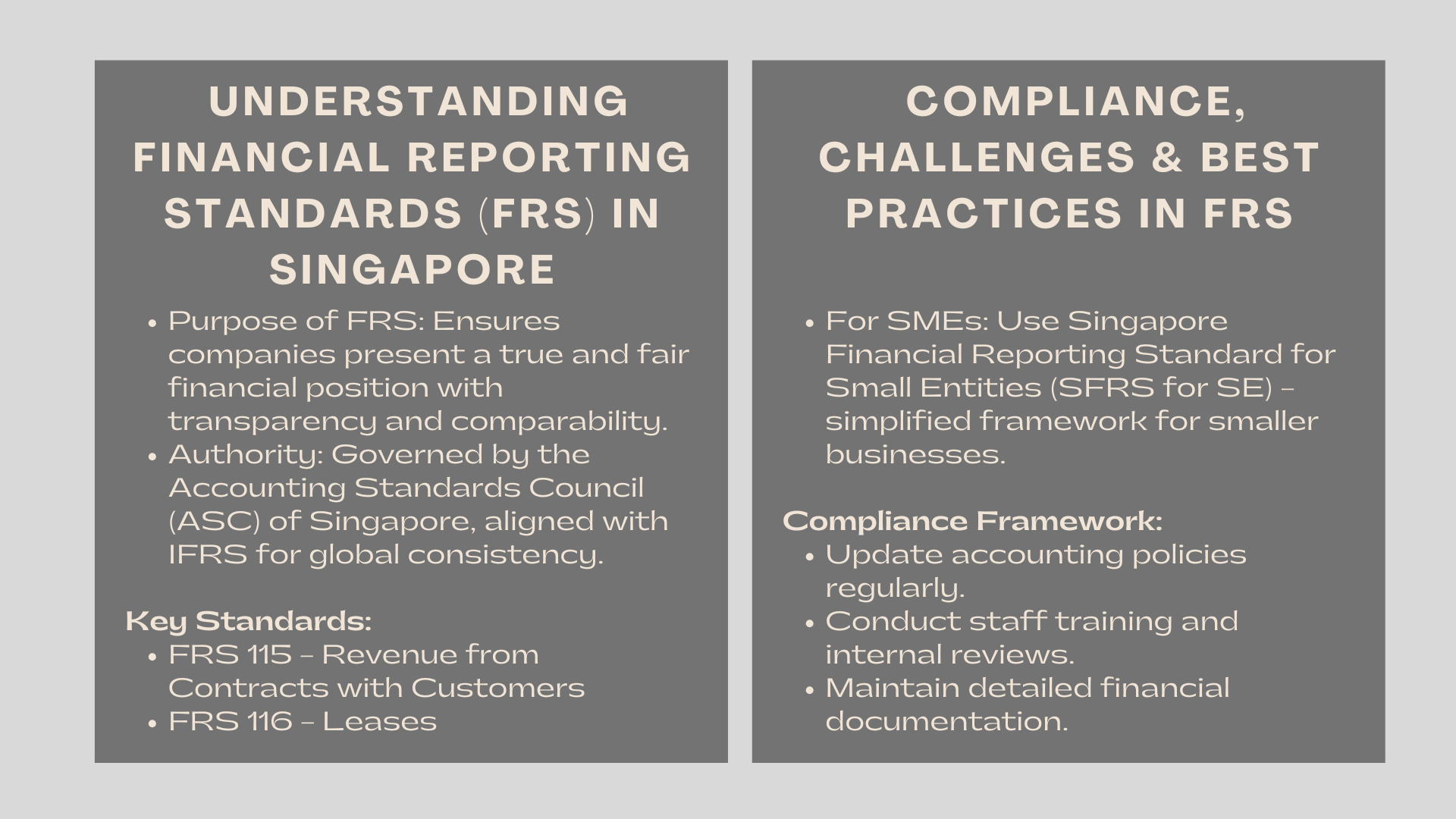Financial Reporting Standards (FRS) in Singapore – A Quick Guide
The financial reporting framework in Singapore is aimed at ensuring that companies give a true and fair opinion of the financial performance and position of the company. These standards assist in ensuring consistency, transparency and comparability of financial statements- assisting investors, regulators and the stakeholders generate informed decisions.
Regardless of the size of a company, it is important to comprehend the Financial Reporting Standards (FRS) so that the company is not subject to nonconformance with the accounting regulations in Singapore. Understanding these standards is also a key aspect of maintaining corporate compliance in Singapore, ensuring that businesses operate transparently and in accordance with statutory requirements. This guide gives a brief of the main standards to be used by the Singapore entities and the compliance requirements of the small and medium enterprises (SMEs).

Singaporean Financial Reporting Standards Overview.
What Does Financial Reporting Standards (FRS) Mean?
Financial Reporting Standards comprise a collection of rules regulating accounting procedures as stipulated by Accounting Standards Council (ASC) of Singapore. They control the way businesses are supposed to prepare, present as well as disclose financial statements.
In a great extent, these standards are consistent with the International Financial Reporting Standards (IFRS), making sure that the financial reporting in Singapore is in there with the global best practices. The key financial reporting standards applicable to Singapore companies cover areas such as revenue recognition, financial instruments, leases, and fair value measurement.
Objective of Adopting FRS
Enhancement of reliability and comparability of financial statements is the primary aim of adoption FRS. Regular reporting will create confidence with investors and will make the companies be able to raise funds or collaborate with others. Furthermore, FRS compliance will prevent anomalies that can be questioned in the audits or regulatory audits.
Singapore Companies Key FRS Requirements.
Core FRS Applicant to Majority of Businesses.
The most popular standards applied are:
- FRS 115 – Revenue of Contracts with Customers: Provides the methods of recognizing revenue depending on the transfer of control and not the transfer of risks and award.
- FRS 116 – Leases: This demands that most leases be included on the balance sheet as an asset that represents the right-of-use and a liability that represents the lease.
- FRS 109 – Financial Instruments: This is a guideline on how to classify, measure, and impair financial instruments.
- FRS 2- Share-Based payment: This is the accounting treatment of a compensation plan based on equity.
Compliance with these standards will make companies have a clear and standardized perspective of their financial performance.
Streamlined Standards of Small Entities.
Instead of imposing substantial compliance costs on smaller businesses, Singapore came up with the Singapore Financial Reporting Standard of Small Entities (SFRS of SE). This simplified structure enables qualified SMEs to implement simpler regulations and still achieve accurate and reliable financial reporting.
In order to use this simplified standard, companies are expected to fulfil some requirements like revenue, assets, and employees requirements.
FRS Practices in Compliance and Implementation.
Constructing an Intense Compliance Framework.
To be FRS compliant, it is not enough to be familiar with the rules of accounting. Corporations must have an organized system by which they incorporate the FRS principles into their everyday accounting systems. These encompass constant revision of the accounting policies, ongoing training of the staff and proper documentation to facilitate the disclosures of the finances.
Implementing the FRS compliance requirements for small and medium enterprises in Singapore also involves conducting periodic internal reviews to ensure that financial reports align with current standards and interpretations issued by the ASC.
External Auditors and Accountants Role.
External auditors are important in ensuring that financial statements are in accordance with FRS. They provide the financial reporting of a company with increased credibility because they are independent. Accountants, conversely, make sure that the books of the company are kept in line with the standards related to their maintenance during the financial year.
By employing the professional accountants with the knowledge of FRS, the businesses can prevent getting into any compliance problems and enhance the quality of their financial reporting.
Universal Problems and Best Practices.
Keeping up with Standards Change.
FRS are updated periodically to match the changing international accounting practices and new business trends. Both companies ought to keep up with the updated or introduced standards in a bid to maintain a consistent compliance. Businesses can keep up with the times by subscribing to ASC updates and attending professional accounting workshops.
Using Technology to promote Compliance.
The accounting software in modernity is capable of making the FRS compliance easier through automating financial reporting, maintaining consistency in data, and providing financial statements that are compliant. Cloud solutions are also more efficient in enabling SMEs to receive professional accounting assistance at a low cost.
Conclusion to Financial Reporting Standards FRS in Singapore A Quick Guide
The adherence to the Financial Reporting Standards in Singapore is one of the pillars of transparent and credible business functioning. Knowing the major standards and applying strong accounting practices, the companies can be sure that their financial statements will be accurate in terms of their performance and position.
In the case of SMEs, being in the right FRS framework does not only respond to regulatory requirements but also enhances the financial governance and confidence of investors.




